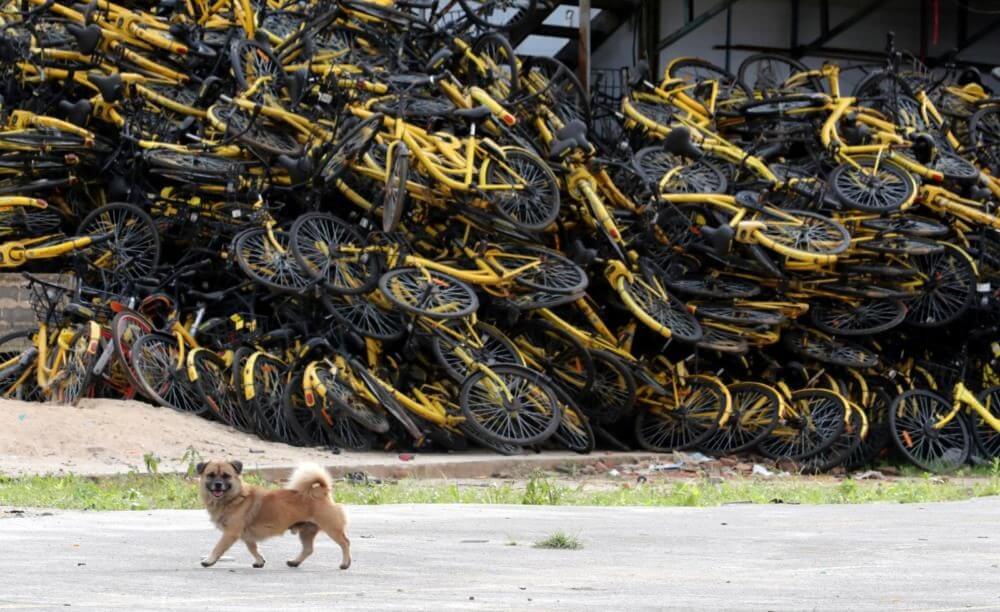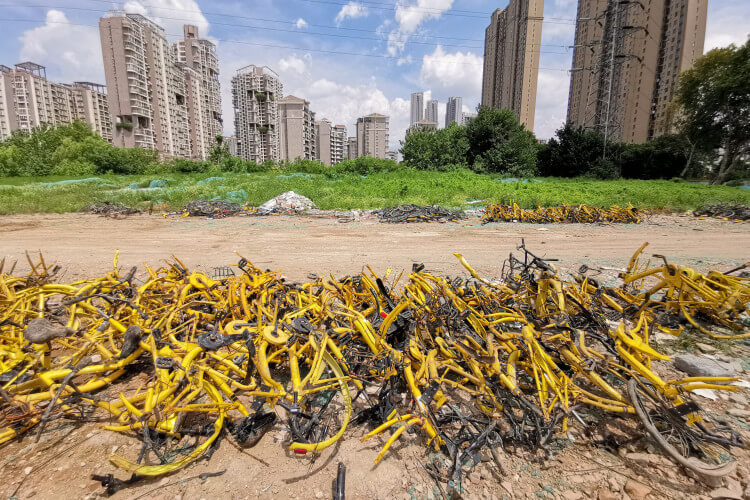The great bike-sharing disaster
Let’s think back, just 3 years ago we read in the economic media news like “The fever of shared bicycles arrives in Spain” the economist
Or WIRED itself with headlines like Why Investors Are Betting That Bike Sharing Is the Next Uber.
Then we read market analysts’ reports with astronomical growth figures and interstellar predictions, followed by announcements of huge investments to capture market share in a very tight business model that deflated as fast as it artificially inflated.
The bike sharing business (and others like it) still has a way to go and its space, but it has to survive adjusted to the real economy, and we will still see more companies fall whose base and profitability is not solid enough.
Contenidos
The end of the “Bike Sharing” bubble
Chinese bike-sharing platform Mobike, with more than 9 million orange bikes operating in more than 200 cities in 16 countries was sold for $2.7 billion to domestic on-demand online service provider Meituan Dianping.
Prior to this, it had raised more than USD 900 million from investors such as Tencent, Foxconn, Hillhouse Capital and Warburg Pincus.
Between 2017 and 2018, Mobike expanded its operations to Singapore, Malaysia, Japan, Israel, Australia, the United Kingdom, Germany, Italy, the Netherlands, France, Albania, Mexico, Chile and the United States. It has since withdrawn from some locations.
The valuation of another bike-sharing company called ofo was reduced from $4 billion to $2.5 billion.
However, potential investors have shown little interest in acquiring ofo, which faces many problems, including mounting debt and a shortage of capital. The situation could further reduce potential bids below $2 billion.
Ofo, which enjoyed the bike-sharing boom of recent years, has been selling its business overseas. It halted operations in Australia, India and the United States, and laid off most of its staff in China, a sign of its slowdown.
Rumors have circulated in recent months about the sale of this major bike-sharing platform. The company has also been involved in a lawsuit with a major supplier, after being sued by Shanghai-based manufacturer Phoenix Bicycles for unpaid invoices.
The lawsuit caught the attention of other ofo suppliers, who are concerned about possible defaults on ofo’s orders.
“Phoenix Bicycles is a publicly traded company, and what it did negatively affected its business performance,” said a source close to the bike-sharing supply chain, who did not want to be identified.
The capital market has lost its appetite for ofo due to its growing financial problems. Some investors even believe that the company’s valuation should be as low as $1 billion. This pessimism has weighed on the Beijing-based Internet startup’s day-to-day operations, and many think it faces a demise.
In July, a supplier that produces smart locks stopped services to 3 million bicycles owned by ofo, which was more than six months behind on its payments.
It also owes millions of yuan in logistics fees to companies such as Deppon Logistics Co and Best Inc.
Why haven’t bike-sharing companies been as successful as some of their investors had hoped?
In countries with a low cost of living, adjusted rents were charged to make bike sharing attractive to the masses. In this business, high capital expenditure is required to build and deploy the bicycles in large quantities. In most of these countries, rising costs and low revenues indicated that the business was unprofitable and unsustainable even with a long-term view.
It was very common to see how many bike share brands suffered from bike mistreatment. In Singapore, there were reports of people throwing bicycles down high floors, canals and rivers, and here in Spain I still remember how short-lived the bicycles were in Granada, which was a disaster for Ofo that finally withdrew to “more profitable markets”, the large amount of theft and vandalism marked the withdrawal of many of these companies in some countries.
Many cities in emerging countries where large companies deployed huge fleets lack adequate bicycle lanes and sidewalks, this, coupled with heavily congested roads, creates a hazard for cyclists. In addition, the low cost of bicycles can make it more economical to buy than to rent.
In February last year, China’s transport ministry reported that more than 20 of the 77 bike-sharing startups had shut down; five bike-sharing companies have gone bankrupt. Up to USD 150 million in deposits could not be reimbursed to users.
In Singapore, oBike ceased operations last June and is now at the center of a police investigation into alleged misuse of user deposits. Despite these setbacks, bike-sharing companies have been making optimistic comments in public. They seem to be closing businesses in countries where the bike sharing economy doesn’t work and are focusing on countries where they can survive and perhaps thrive.
China’s bike-sharing craze five years ago sucked in billions of dollars in investor cash and customer deposits that startups spent on millions of new bikes in an effort to gain market share. When the inevitable collapse occurred, most of the companies went bankrupt, forcing the city authorities to pay to clean up the mess.
What happened to the giant piles of abandoned bicycles in China?
“When the new industry was deemed profitable, everyone jumped in to share a piece of the pie. “Said Yang Tengfei, deputy general manager of China Recycling Resources Co, which works with companies in recycling. “Capital flew in but management stayed behind, leaving an industry full of problems.”
The sheer volume of abandoned bicycles is overwhelming. A government unit estimates that there were as many as 20 million bikeshare bikes in use in 2017. Xiaoming, just one of about 60 bike-sharing app companies that went bankrupt, left 430,000 of them in more than 10 cities. One of the largest piles in downtown Shanghai had 30,000 abandoned bicycles, according to Xinhua.
Today, only three brands are commonly seen in major cities. Yang ‘s China Recycling has scrapped about 4 million shared bicycles since 2017. It spends about 10 million yuan each month on buying used bicycles and spare parts to salvage steel, metal and plastic.
Conclusions
The oversized predictions of business models tend to have dramatic results in the short term and these months we see growing interest in the “Bike subscription” business models (especially oriented to electric bicycles) where they opt for a subscription model with a monthly payment for use, are having important announcements of VC firms capital injections (very relevant in some cases) in European companies with little focus on the product, it gives me for another analysis so I hope to publish it soon.


